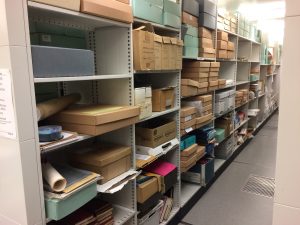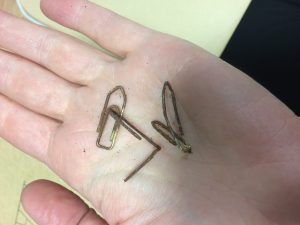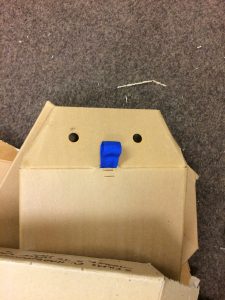The University records manager, David Jenkins, and I (Vicky Holmes, University Archivist) thought we’d take the opportunity to flag up IAD18 and explain a bit about what we do all day!
On the 9th of June 1948, the International Council on Archives was created under the auspices of the UNESCO (the United Nations Educational, Scientific and Cultural Organisation), to promote the preservation and use of archives around the world. In pursuing this mission, ICA works for the protection and enhancement of the memory of the world and to improve communication while respecting cultural diversity (ICA website https://www.ica.org/en/mission-aim-and-objectives).
The first International Archives Day was in 2008 and involved archivists from many countries, promoting archives and the work that archivists do. Going back to basics, records and archives are documents created, received and maintained as evidence and information by an organization or person, in pursuance of legal obligations, or in the transaction of business. Archival records are those documents that are preserved by their creators, successors or an appropriate archive institution because of their legal value or enduring historical significance. Archives constitute a major cultural heritage and information resource. The archival heritage is a valuable testimony about the economical, political and social development of humanity. The diversity of archival sources and formats is considerable (definitions from the ICA website).
The University’s Records Management Services play an important role in our organisational recordkeeping, typically at the start of a record’s life, whereas the archives team are more heavily involved at the end of a record’s life. Records management involves ensuring that records are created to document our activities and decisions; this can be for day-to-day operational use, organisational accountability or compliance purposes. An important aspect of records management is making decisions on how long records are retained for- this involves balancing business needs, compliance and legislative requirements, and potential long term historical value of the information (which links in with the work of Archives and Special Collections). Records management also involves ensuring appropriate storage of our records which can be an increasing struggle as office space is often at a premium. The University has an off-site document storage contract in place to enable short-medium term retention of documents which cannot be accommodated on-campus. Finally, records management is also closely involved with the University’s responsibilities under new Data Protection legislation, also known as GDPR (which many people are now becoming more aware of thanks to a deluge of emails from service providers keen to ‘keep in touch’). The records management service (alongside colleagues in Information Assurance Services) develops data protection related guidance and is responsible for ensuring we keep accurate records of the various reasons for our collection and use of personal data.
Archives and Special Collections at the University of Leicester are really the institutional memory, as we hold records from the foundation period in the early 20th Century, right up to records being created today (we are working on being able to take in born-digital records!). We’re here to answer questions about the history of the University, or the collections we hold relating to modern literary works (including Sue Townsend, Joe Orton, Caroline Holden, David Campton) and our rare books. We also take in records from students, staff, alumni, former staff and anyone who would like to offer us material that supports our aim to tell the story of the University and its people. We can’t keep everything though – particularly as the volume of information has grown so much – we preserve around 5% of the records created by the University as a whole. We spend time appraising the records and describing each on our archives catalogue Calm, so that people can browse or search to find what they need. We take care of the physical side of preserving archives, by ensuring they are in appropriate storage equipment and environment, and removing anything that might cause them harm.
Part of our work also involves explaining to people what we do and how we can help their work. We have recently run or contributed to workshops for local school children, undergraduate and postgraduate students here and members of the public, and our latest exhibition, about women in the history of the University, is now on in the basement of the David Wilson Library and viewable 9-5 Monday to Friday – come and see it! We have a part-time staff member working on increasing our knowledge of the founding of the College in response to the First World War, so do look out for the results of this project later this year.
I (Vicky) am quite new to the archive service here and haven’t had time to find my favourite item in the archive yet – but I am excited to explore the riches of the collection and work with the University community to ensure we have lots to celebrate for IAD19! I will leave you with a picture of a box I found while working on a project to move lots of our archives – not sure it approved of being broken up for recycling!
Have you used our archives in your work? You can follow the International Archives Day thread on twitter and shout about how great archives are at #IAD2018!




 Subscribe to vholmes's posts
Subscribe to vholmes's posts
Recent Comments